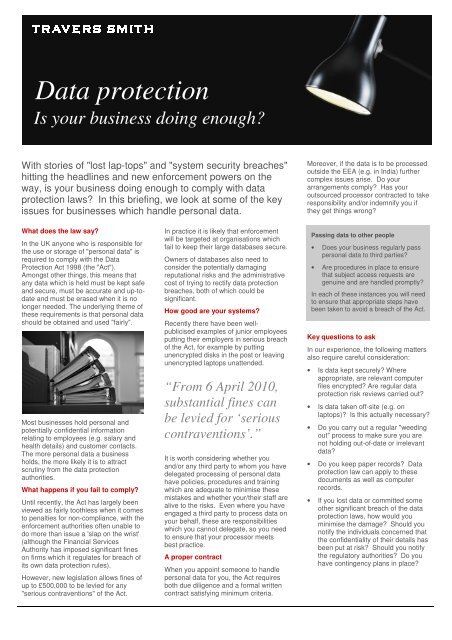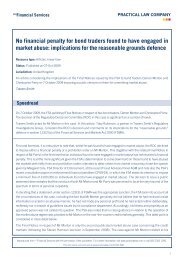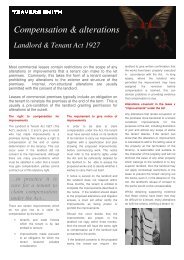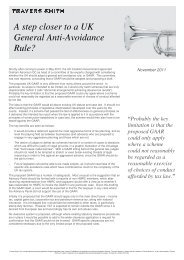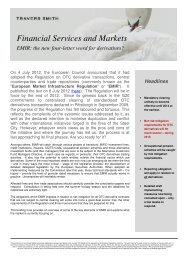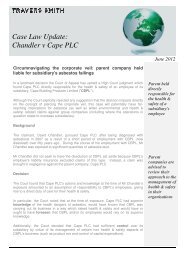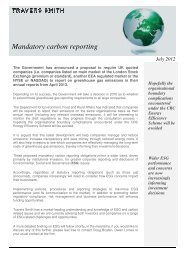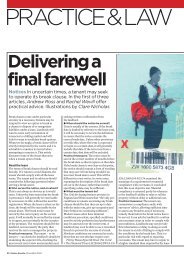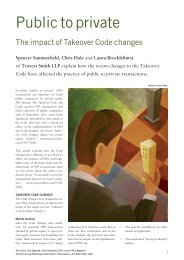Data protection: is your business doing enough? - Travers Smith
Data protection: is your business doing enough? - Travers Smith
Data protection: is your business doing enough? - Travers Smith
You also want an ePaper? Increase the reach of your titles
YUMPU automatically turns print PDFs into web optimized ePapers that Google loves.
<strong>Data</strong> <strong>protection</strong><br />
Is <strong>your</strong> <strong>business</strong> <strong>doing</strong> <strong>enough</strong>?<br />
With stories of "lost lap-tops" and "system security breaches"<br />
hitting the headlines and new enforcement powers on the<br />
way, <strong>is</strong> <strong>your</strong> <strong>business</strong> <strong>doing</strong> <strong>enough</strong> to comply with data<br />
<strong>protection</strong> laws? In th<strong>is</strong> briefing, we look at some of the key<br />
<strong>is</strong>sues for <strong>business</strong>es which handle personal data.<br />
Moreover, if the data <strong>is</strong> to be processed<br />
outside the EEA (e.g. in India) further<br />
complex <strong>is</strong>sues ar<strong>is</strong>e. Do <strong>your</strong><br />
arrangements comply? Has <strong>your</strong><br />
outsourced processor contracted to take<br />
responsibility and/or indemnify you if<br />
they get things wrong?<br />
What does the law say?<br />
In the UK anyone who <strong>is</strong> responsible for<br />
the use or storage of "personal data" <strong>is</strong><br />
required to comply with the <strong>Data</strong><br />
Protection Act 1998 (the "Act").<br />
Amongst other things, th<strong>is</strong> means that<br />
any data which <strong>is</strong> held must be kept safe<br />
and secure, must be accurate and up-todate<br />
and must be erased when it <strong>is</strong> no<br />
longer needed. The underlying theme of<br />
these requirements <strong>is</strong> that personal data<br />
should be obtained and used "fairly".<br />
Most <strong>business</strong>es hold personal and<br />
potentially confidential information<br />
relating to employees (e.g. salary and<br />
health details) and customer contacts.<br />
The more personal data a <strong>business</strong><br />
holds, the more likely it <strong>is</strong> to attract<br />
scrutiny from the data <strong>protection</strong><br />
authorities.<br />
What happens if you fail to comply?<br />
Until recently, the Act has largely been<br />
viewed as fairly toothless when it comes<br />
to penalties for non-compliance, with the<br />
enforcement authorities often unable to<br />
do more than <strong>is</strong>sue a 'slap on the wr<strong>is</strong>t'<br />
(although the Financial Services<br />
Authority has imposed significant fines<br />
on firms which it regulates for breach of<br />
its own data <strong>protection</strong> rules).<br />
However, new leg<strong>is</strong>lation allows fines of<br />
up to £500,000 to be levied for any<br />
"serious contraventions" of the Act.<br />
In practice it <strong>is</strong> likely that enforcement<br />
will be targeted at organ<strong>is</strong>ations which<br />
fail to keep their large databases secure.<br />
Owners of databases also need to<br />
consider the potentially damaging<br />
reputational r<strong>is</strong>ks and the admin<strong>is</strong>trative<br />
cost of trying to rectify data <strong>protection</strong><br />
breaches, both of which could be<br />
significant.<br />
How good are <strong>your</strong> systems?<br />
Recently there have been wellpublic<strong>is</strong>ed<br />
examples of junior employees<br />
putting their employers in serious breach<br />
of the Act, for example by putting<br />
unencrypted d<strong>is</strong>ks in the post or leaving<br />
unencrypted laptops unattended.<br />
“From 6 April 2010,<br />
substantial fines can<br />
be levied for ‘serious<br />
contraventions’.”<br />
It <strong>is</strong> worth considering whether you<br />
and/or any third party to whom you have<br />
delegated processing of personal data<br />
have policies, procedures and training<br />
which are adequate to minim<strong>is</strong>e these<br />
m<strong>is</strong>takes and whether <strong>your</strong>/their staff are<br />
alive to the r<strong>is</strong>ks. Even where you have<br />
engaged a third party to process data on<br />
<strong>your</strong> behalf, these are responsibilities<br />
which you cannot delegate, so you need<br />
to ensure that <strong>your</strong> processor meets<br />
best practice.<br />
A proper contract<br />
When you appoint someone to handle<br />
personal data for you, the Act requires<br />
both due diligence and a formal written<br />
contract sat<strong>is</strong>fying minimum criteria.<br />
Passing data to other people<br />
• Does <strong>your</strong> <strong>business</strong> regularly pass<br />
personal data to third parties?<br />
• Are procedures in place to ensure<br />
that subject access requests are<br />
genuine and are handled promptly?<br />
In each of these instances you will need<br />
to ensure that appropriate steps have<br />
been taken to avoid a breach of the Act.<br />
Key questions to ask<br />
In our experience, the following matters<br />
also require careful consideration:<br />
• Is data kept securely? Where<br />
appropriate, are relevant computer<br />
files encrypted? Are regular data<br />
<strong>protection</strong> r<strong>is</strong>k reviews carried out?<br />
• Is data taken off-site (e.g. on<br />
laptops)? Is th<strong>is</strong> actually necessary?<br />
• Do you carry out a regular "weeding<br />
out" process to make sure you are<br />
not holding out-of-date or irrelevant<br />
data?<br />
• Do you keep paper records? <strong>Data</strong><br />
<strong>protection</strong> law can apply to these<br />
documents as well as computer<br />
records.<br />
• If you lost data or committed some<br />
other significant breach of the data<br />
<strong>protection</strong> laws, how would you<br />
minim<strong>is</strong>e the damage? Should you<br />
notify the individuals concerned that<br />
the confidentiality of their details has<br />
been put at r<strong>is</strong>k? Should you notify<br />
the regulatory authorities? Do you<br />
have contingency plans in place?
How we can help<br />
We are always happy to d<strong>is</strong>cuss any data<br />
<strong>protection</strong> questions with you. We won't<br />
charge you for straightforward queries and<br />
if we think there <strong>is</strong>n't a problem, we'll tell<br />
you. We also have substantial experience<br />
of carrying out thorough data <strong>protection</strong><br />
"health checks" to identify potential<br />
problems and of ass<strong>is</strong>ting in compiling data<br />
<strong>protection</strong> policies and handbooks. We<br />
have recently adv<strong>is</strong>ed:<br />
The pension fund trustees of a major UK plc<br />
on a thorough data <strong>protection</strong> compliance<br />
review, with particular emphas<strong>is</strong> on intra-group<br />
data transfers, subject access requests,<br />
overseas transfers and system security.<br />
“Clients say <strong>Travers</strong> <strong>Smith</strong>’s Dan<br />
Reavill <strong>is</strong> ‘tactically astute with a<br />
tremendous eye for detail’.”<br />
Chambers Guide to the UK Legal Profession<br />
A well-known UK financial services group<br />
in relation to widespread subject access<br />
requests being made on behalf of customers by<br />
a consumer credit compensation scheme.<br />
“A good straight-talking team”<br />
[that] “doesn’t over-lawyer<br />
things.”<br />
Chambers Guide to the UK Legal Profession<br />
A major UK group active in the le<strong>is</strong>ure sector<br />
in relation to its data <strong>protection</strong> policies and<br />
procedures, with particular reference to direct<br />
marketing.<br />
“<strong>Travers</strong> <strong>Smith</strong> <strong>is</strong> able to present<br />
clients with cons<strong>is</strong>tent teams of<br />
uniformly excellent lawyers.”<br />
The Legal 500<br />
<strong>Travers</strong> <strong>Smith</strong> LLP<br />
10 Snow Hill<br />
London EC1A 2AL<br />
T +44 (0)20 7295 3000<br />
F +44 (0)20 7295 3500<br />
www.traverssmith.com<br />
The <strong>Data</strong> Protection Team<br />
Dan Reavill<br />
dan.reavill@traverssmith.com<br />
+44 (0)20 7295 3260<br />
Al<strong>is</strong>tair Wilson<br />
al<strong>is</strong>tair.wilson@traverssmith.com<br />
+44 (0)20 7295 3345<br />
<strong>Travers</strong> <strong>Smith</strong> LLP <strong>is</strong> a limited liability partnership reg<strong>is</strong>tered in England and Wales under number OC 336962 and <strong>is</strong> regulated by the Solicitors Regulation Authority. The word "partner" <strong>is</strong> used to refer to a member of <strong>Travers</strong> <strong>Smith</strong> LLP. A l<strong>is</strong>t of the members of <strong>Travers</strong><br />
<strong>Smith</strong> LLP <strong>is</strong> open to inspection at our reg<strong>is</strong>tered office and principal place of <strong>business</strong>: 10 Snow Hill, London, EC1A 2AL. We are not author<strong>is</strong>ed under the Financial Services and Markets Act 2000 but we are able, in certain circumstances, to offer a limited range of<br />
investment services because we are members of the Law Society of England and Wales and regulated by the Solicitors Regulation Authority. We can provide these investment services if they are an incidental part of the professional services we have been engaged to<br />
provide. The information in th<strong>is</strong> document <strong>is</strong> intended to be of a general nature and <strong>is</strong> not a substitute for detailed legal advice.


